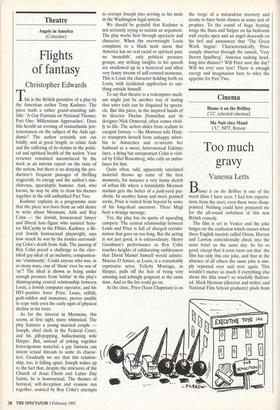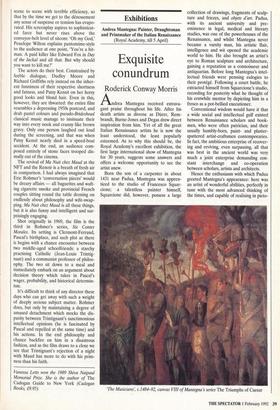Cinema
Blame it on the Bellboy ('12', selected cinemas)
Too much gravy
Vanessa Letts
Blame it on the Bellboy is one of the worst films I have seen. I had low expecta- tions from the start; even these were disap- pointed. Nothing could have prepared me for the all-round awfulness of this new British comedy.
The film is set in Venice and the joke hinges on the confusion which ensues when three English tourists called Orton, Horton and Lawton coincidentally check into the same hotel on the same day. So far so good, except that it soon turns out that the film has only this one joke, and that in the absence of all others the same joke is sim- ply repeated over and over again. This wouldn't matter so much if everything else about the film wasn't so woefully flatfoot- ed. Mark Herman (director and writer, and National Film School graduate) plods from scene to scene with terrible efficiency, so that by the time we get to the denouement any sense of suspense or tension has evapo- rated. His screenplay aspires to sophisticat- ed farce but never rises above the conveyor-belt level of sitcom: 'Oh my God,' Penelope Wilton explains pantomime-style to the audience at one point, 'You're a hit- man. A paid killer like Edward Fox in Day of the Jackal and all that. But why should you want to kill me?'
The actors do their best. Constrained by feeble dialogue, Dudley Moore and Richard Griffiths rely instead on the inher- ent funniness of their respective shortness and fatness, and Patsy Kensit on her horsy good looks and blond hair. Even in this, however, they are thwarted: the entire film resembles a depressing 1950s postcard, and drab pastel colours and pseudo-Brideshead classical music manage to insinuate their way into every nook and cranny like brown gravy. Only one person laughed out loud during the screening, and that was when Patsy Kensit nearly died in a speed-boat accident. At the end, an audience com- posed entirely of stone faces trooped dis- mally out of the cinema.
The revival of Ma Nuit chez Maud at the NV!' and the Renoir is a breath of fresh air in comparison. I had always imagined that Eric Rohmer's 'conversation pieces' would be dreary affairs — all baguettes and waft- ing cigarette smoke and provincial French couples sitting round the table droning on endlessly about philosophy and wife-swap- ping. Ma Nuit chez Maud is all these things, but it is also funny and intelligent and sur- prisingly engaging.
Shot originally in 1969, the film is the third in Rohmer's series, Six Contes Morales. Its setting is Clermont-Ferrand, Pascal's birthplace, and such plot as there is begins with a chance encounter between two middle-aged schoolfriends: a starchy practising Catholic (Jean-Louis Trintig- nant) and a communist professor of philos- ophy. The two sit down to a meal and immediately embark on an argument about decision theory which takes in Pascal's wager, probability, and historical determin- ism.
It's difficult to think of any director these days who can get away with such a weight of deeply serious subject matter. Rohmer does, but only by maintaining a degree of amused detachment which mocks the dis- parity between Trintignant's sanctimonious intellectual opinions (he is fascinated by Pascal and repelled at the same time) and his actions. In the end philosophy and chance backfire on him in a disastrous fashion, and as the film draws to a close we see that Trintignant's rejection of a night with Maud has more to do with his prim- ness than his faith.
Vanessa Letts won the 1989 Shiva Naipaul Memorial Prize. She is the author of The Cadogan Guide to New York (Cadogan Books, f9.95).



















































 Previous page
Previous page